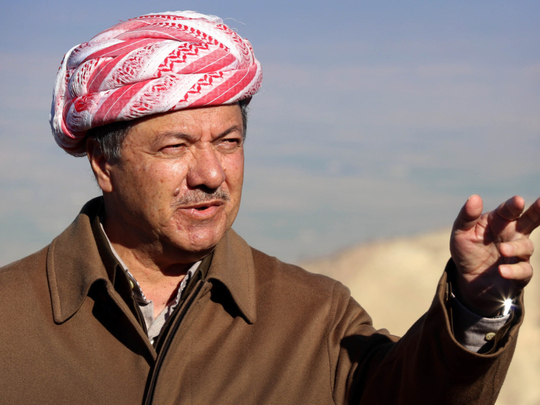
In Iraq’s rapidly changing political landscape, the country’s Kurdish community has perhaps made the most significant strategic gains from the recent instability. Taking advantage of the near-complete collapse of the Iraqi army following the fall of Mosul to Daesh (Islamic State of Iraq and the Levant) in June, President of the Iraqi Kurdistan Regional Government (KRG) Masoud Barzani declared that the only thing standing in the way of the outright independence of the Iraqi Kurdistan Region were mere procedural matters.
Barzani’s statement provoked a wave of anger in Iraq and across the Arab world. Critics accused ethnic Kurdish parties of trying to exploit the present political and security crisis in Iraq and Syria to realise their long-awaited dream of establishing an independent Kurdish state. Some of this criticism does not seem unfounded. Since the beginning of the protest movement against the government of former Iraqi Prime Minister Nouri Al Maliki in early 2012, the Arbil local administration adopted economic and security policies focused exclusively on attaining Kurdish independence.
To add insult to injury, the KRG exploited the collapse of the Iraqi military in the north eastern parts of the country to take control of the disputed territories, particularly those around Kirkuk. Units of the Iraqi army were driven from the frontiers of the Kurdistan Region during clashes with the Kurdish fighters of the Peshmerga. In addition, the KRG continued to sell the oil produced within its territories against the will of the federal government. Having gone this far in challenging Baghdad’s authority, the KRG’s inclination to seek independence not come as a surprise.
In fact, the rise of Daesh has just accelerated a process that was already in motion. Before the fall of Mosul, the deteriorating security situation in the west of the country was the most significant challenge for Kurdish decision-makers. The Baghdad government’s endeavours to stabilise the Sunni provinces had failed. Policies of marginalisation and exclusion by the Al Maliki government had further exacerbated the situation. The Kurds called upon Al Maliki to pursue a more inclusive approach in dealing with Sunni Arabs as part of a comprehensive effort to stabilise the country. Al Maliki refused to heed the call.
This was not the only reason for animosity. Tensions between the central government in Baghdad and the regional administration in Arbil continued to mount over a host of other issues. Central among these were providing safe haven for Sunni leaders escaping Al Maliki government persecution; differences over the definition of the status of the disputed areas; and attempts by the Baghdad government to compel the Peshmerga to withdraw from areas they had captured in the aftermath of the US invasion in 2003 (including Sinjar, Aqra and Khanqeen).
When Daesh took control of Mosul, the KRG had already secured a measure of economic independence from Baghdad on account of its successful production and export of oil with Turkish help. With Kurdish forces taking control over the disputed areas, the road was cleared for de facto, complete, and de jure independence of the Iraqi Kurdistan.
Turkey’s ruling Freedom and Justice Party (AKP) has already given near tacit approval to the moves. While the Turkish government does not approve of the idea of a Kurdish state, it seeks to use the KRG as a leverage over the Kurdish population within its own borders. Defined by its pragmatism, the Turkish government might be more than willing to see an expression of Kurdish national identity so long as it is in Iraq, even if it is at the expense of its neighbour’s territorial integrity.
Before the fall of Mosul, an independent KRG was not an idea that either regional or global powers would take seriously. The spectre of a civil war in Iraq, made real by the fall of Mosul, ushered in a new status quo. The urgency of the threats challenging Iraq changed the political scene enough that, today, some world powers, while outwardly expressing their support for the territorial integrity of Iraq, have come around to the idea of a separate country — Iraqi Kurdistan. Israel has gone so far as to openly declare its support for an independent Kurdistan, while US President Barack Obama made a statement that appeared open to the idea. Obama acknowledged the impossibility of holding all of the components of the Iraqi people together through force alone, given the fragmented state of Iraqi politics and the inability of politicians to come to an agreement about how to manage the country. Thanks to Daesh, the fragmentation and disintegration of Iraq has become more real and possible today than any time in the past.
Dr Marwan Kabalan is a Syrian academic and writer.










